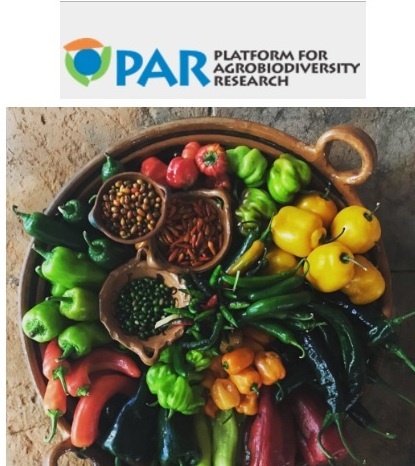Platform for Agrobiodiversity Research (PAR) : Working together to improve Knowledge of Agrobiodiversity maintenance and use


(This Booklet describes work undertaken by the PAR : the results of an interdisciplinary research project in eight biocultural landscapes)
The idea of establishing a Platform for Agrobiodiversity Research (PAR) was welcomed by the Seventh Conference of the Parties to the CBD in 2004. Since its establishment in Rome in 2006, the PAR platform - hosted by Bioversity International - has aimed to support the development of knowledge needed to maintain and use agrobiodiversity optimally.
[2017 Call for Organic Innovations - till 31 July 2017. The authors of the best solutions will have the opportunity to present their innovation at the third edition of the Organic Innovation Days on 15-17 November 2017 in Brussels].
Agrobiodiversity is a key component of overall biodiversity. It is the result of natural selection processes and creative thinking of farmers, herders and fishers over millennia. Agrobiodiversity is a vital, fundamental part of biodiversity. Food and livelihood security and people’s health very much depend on the sustained management of biological resources .., - Why Agrobiodiversity, CAPSELLA |
Agrobiodiversity in agricultural landscapes supports the delivery of regulating and supporting ecosystem services such as pest and disease control and pollination. Agrobiodiversity and the services it provides also confer resilience of agricultural systems, which can be described as their capacity to continually change, adapt and transform in response to external drivers, internal processes and have the opportunity for novelty and innovation.
The simplification of land-use patterns and cropping systems is associated with a reduction of agrobiodiversity. The loss of agrobiodiversity leads to a reduced capacity of agricultural landscapes to support sustainable production and rural livelihoods, particularly in the face of climate change.
Platform for Agrobiodiversity Research (PAR) : Why?
The overall goal of the PAR is to enhance the sustainable management and use of agrobiodiversity by improving knowledge of all its different aspects.
To support the development of an adequate Agrobiodiversity Knowledge Base | through collating, synthesizing and disseminating agrobiodiversity knowledge, making available the relevant tools and practices that support improved use of agrobiodiversity, and identifying areas where information is lacking and new knowledge is needed. |
To identify ways in which Agrobiodiversity can contribute to addressing some of the major global challenges faced today | (e.g. environmental degradation, poverty alleviation, climate change, water quality and scarcity, and new global disease threats) by making available the information and options that ensure the contribution of agrobiodiversity in these areas. |
To identify and facilitate relevant new and innovative research partnerships, that strengthen multidisciplinary and participatory Agrobiodiversity Research, | and involve work on different agro-ecosystem components (such as livestock, crops, soils, pollinators, etc.) and contribute to building agrobiodiversity research capacity, particularly in the developing regions. |
PAR'S Researcher Database
is an online registry compiling information about experts working in the different fields of agrobiodiversity worldwide.
Its main objective is to serve as a repository and access point to find experts working in the different fields of agrobiodiversity, learn about their research activities, and get in touch with them. It allows users to search for experts according to different criteria such as name, field of expertise, affiliated institution, geographic location, institution type.
PAR's Initiative : LIBERATION Community of Practice on Ecological Intensification
LIBERATION stands for LInking farmland Biodiversity to Ecosystem seRvices for effective ecological intensification.
The land sparing and sharing debate is gaining importance in Research&Development and it will play a key role in ecological intensification at a policy and implementation level. Hence, PAR is excited to work with you through this tool and has prepared a number of discussions that are relevant to ecological intensification. To this end, PAR has set up : - Synthesis of discussions - Glossary of terms on ecosystem services in agriculture - Annotated Bibliography on Ecological Intensification - Comparative table: Eco-functional, sustainable and ecological intensification |
LIBERATION Project has provided the evidence base for ecological intensification and demonstrated the concept in seven representative agricultural landscape types in Europe.
In particular, using existing datasets from past and on-going European-scale studies, LIBERATION has identified general relationships between the configuration of semi-natural habitats, on-farm management and biodiversity in a range of European landscapes and farming systems. Using a modelling approach, LIBERATION links biodiversity to ecosystem services, by determining relationships between biodiversity, the delivery of multiple ecosystem services and agronomic yield.
Source: Platform for Agrobiodiversity Research
Related content:
|
- Sapienza, in collaboration with the Platform for Agrobiodiversity Research (PAR) and Bioversity International
- Agrobiodiversity considerations in land-use decisions
- Biology Research Network BioRN is launched : get involved !
- TRANSFORMING FOOD & FARMING : AN ORGANIC VISION FOR EUROPE IN 2030
- Seedmap.org : an online portal on Seeds, Biodiversity and Food
- Open Source Seed Initiative : Fair and Open Access to plant genetic resources worldwide
- AnaEE France : a research infrastructure for the study of continental ecosystems and their biodiversity
- BIO-Diverse : for Science, Education and Communication
- Bioversity International: open research for development in agricultural and tree biodiversity
- Recommendations for improving GBIF-mediated data for agrobiodiversity research
- Crop Ontology: harmonizing semantics for phenotyping and agronomy data

